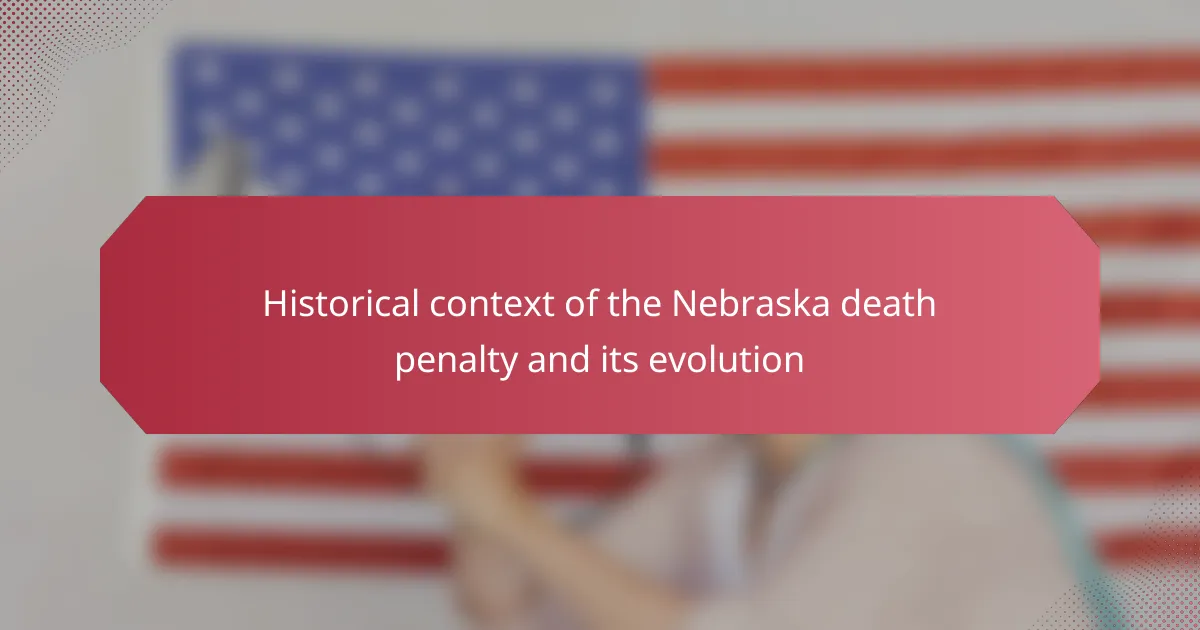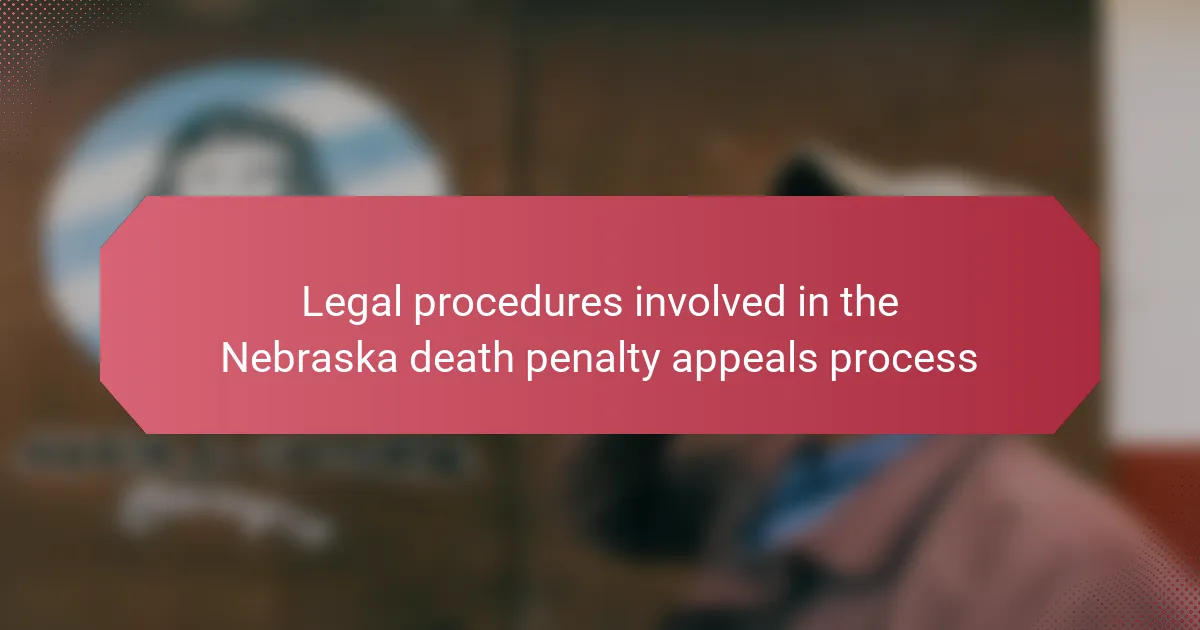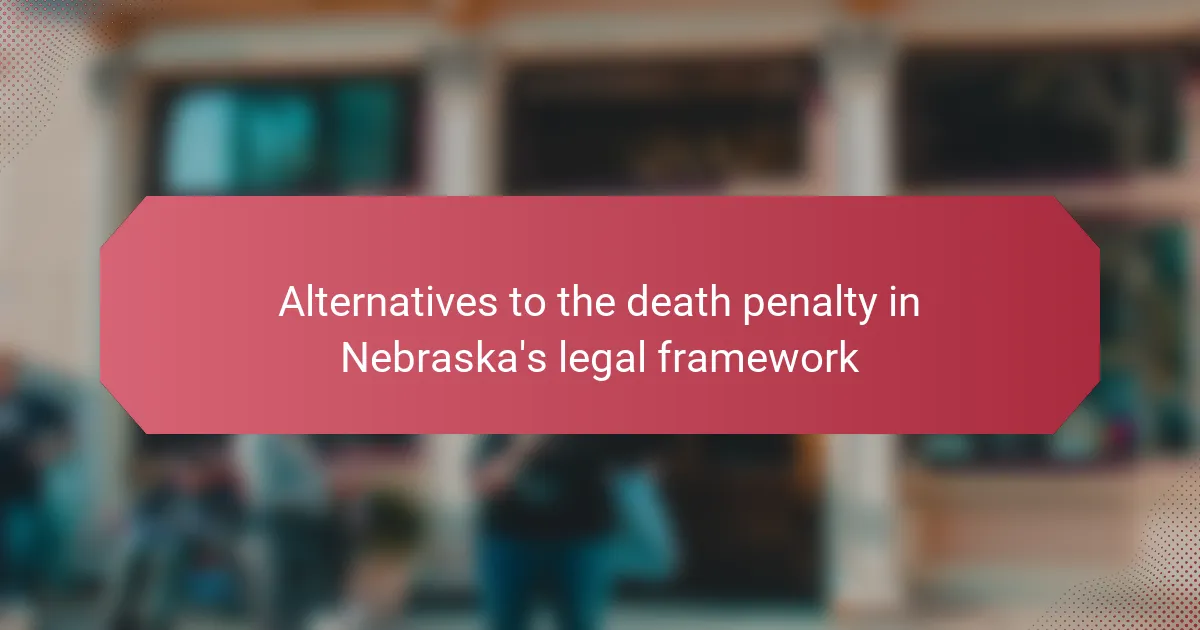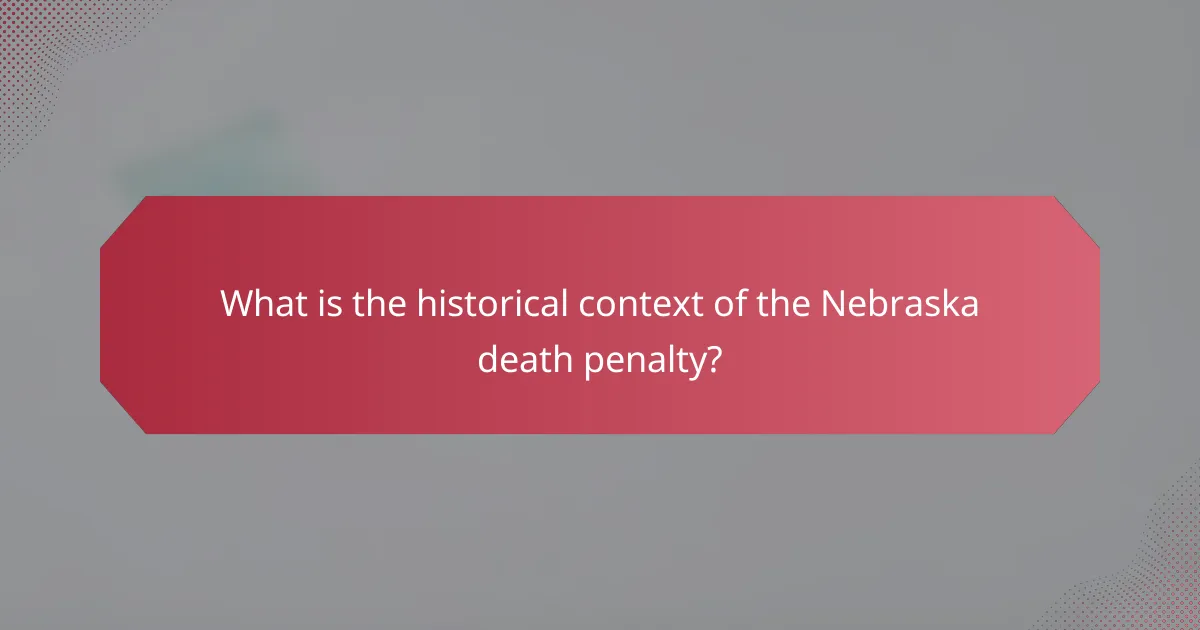
What is the historical context of the Nebraska death penalty?
The Nebraska death penalty has a complex historical context. It was first enacted in Nebraska in 1873. Initially, hanging was the primary method of execution. In 1913, the state adopted electrocution as the method of execution. However, in 1972, the Nebraska Supreme Court ruled the death penalty unconstitutional. This decision effectively abolished it until 1979 when the legislature reinstated it. In 2008, the state switched back to lethal injection as the method of execution. In 2015, the Nebraska legislature voted to abolish the death penalty again, but Governor Pete Ricketts vetoed the bill. The death penalty remains a contentious issue in Nebraska, reflecting ongoing debates about its morality and effectiveness.
How has the Nebraska death penalty evolved over time?
The Nebraska death penalty has undergone significant changes since its inception. Initially, it was established in 1873, allowing execution by hanging. In 1913, the method was changed to electrocution, reflecting a shift towards more modern execution methods. In 1972, the U.S. Supreme Court’s decision in Furman v. Georgia effectively invalidated the death penalty across the country, leading Nebraska to suspend executions.
In 1979, the state reinstated the death penalty, adopting lethal injection as the primary method in 2009. However, public opinion fluctuated, leading to legislative attempts to abolish it. In 2015, the Nebraska legislature voted to abolish the death penalty, but the governor vetoed the bill.
In 2016, voters reinstated the death penalty through a ballot measure. The evolution reflects changing societal attitudes and legal challenges surrounding capital punishment.
What key events have influenced the evolution of the death penalty in Nebraska?
Key events influencing the evolution of the death penalty in Nebraska include the 1972 U.S. Supreme Court decision in Furman v. Georgia. This ruling temporarily halted capital punishment across the United States, affecting Nebraska’s practices. In 1979, Nebraska reinstated the death penalty with a new law. The state faced several legal challenges regarding its methods of execution, particularly lethal injection. In 2015, Nebraska’s legislature voted to abolish the death penalty, overriding a gubernatorial veto. However, in 2016, the state reinstated it through a ballot initiative. These events reflect the ongoing debates and shifts in public opinion regarding capital punishment in Nebraska.
How have societal attitudes towards the death penalty changed in Nebraska?
Societal attitudes towards the death penalty in Nebraska have shifted significantly over recent decades. In the 1990s, public support for capital punishment was high, with around 75% of Nebraskans favoring it. However, this support has declined, particularly in the 2010s. A 2016 poll indicated that only 61% of residents supported the death penalty, reflecting growing concerns about its morality and effectiveness. Legislative changes also mirror this shift. In 2015, Nebraska’s legislature voted to abolish the death penalty, although the decision was later overturned by a referendum in 2016. The ongoing debate highlights a trend towards re-evaluating the justice system and the role of capital punishment in it.
What legal frameworks have shaped the Nebraska death penalty?
The Nebraska death penalty has been shaped by several legal frameworks. The primary legal framework is the Nebraska Revised Statutes, specifically sections 29-2518 to 29-2530. These statutes outline the procedures for capital punishment in Nebraska.
The U.S. Supreme Court rulings have also influenced Nebraska’s death penalty laws. Notable cases include Furman v. Georgia (1972), which temporarily halted the death penalty across the U.S. due to concerns over arbitrary sentencing. This led to Nebraska revising its laws to comply with constitutional standards.
In 2015, the Nebraska Legislature passed a bill to abolish the death penalty, which was later vetoed by the governor. However, in 2016, voters approved a referendum to reinstate it. This reflects the ongoing legal and political debates surrounding capital punishment in the state.
Additionally, the Nebraska Supreme Court has played a crucial role in interpreting death penalty laws. Their decisions have addressed issues such as lethal injection protocols and the constitutionality of certain statutes.
These frameworks collectively illustrate the evolving legal landscape of the Nebraska death penalty, influenced by state legislation, voter decisions, and judicial rulings.
What role has the Nebraska Supreme Court played in death penalty legislation?
The Nebraska Supreme Court has played a significant role in shaping death penalty legislation in the state. It has reviewed and ruled on various cases related to the death penalty’s constitutionality and application. Notably, in 2008, the court upheld the state’s lethal injection protocol. This ruling was pivotal in ensuring the continuation of capital punishment in Nebraska. Additionally, the court has addressed issues of due process and the rights of defendants in capital cases. In 2015, the court struck down a law that sought to eliminate the death penalty, emphasizing judicial review in legislative matters. These decisions have influenced public policy and the state’s approach to capital punishment.
How have federal laws impacted the Nebraska death penalty?
Federal laws have significantly influenced the Nebraska death penalty by establishing constitutional standards for its application. The Supreme Court has ruled on various cases impacting death penalty statutes. For instance, the 1972 case Furman v. Georgia declared that arbitrary application of the death penalty violates the Eighth Amendment. This led to a temporary halt in executions nationwide, including Nebraska.
In 2002, the Supreme Court ruled in Atkins v. Virginia that executing individuals with intellectual disabilities is unconstitutional. This decision affected Nebraska’s ability to impose the death penalty on certain offenders. Additionally, federal laws regarding lethal injection protocols have prompted changes in Nebraska’s execution methods.
Overall, federal rulings have guided Nebraska’s legislative adjustments to comply with constitutional requirements regarding the death penalty.
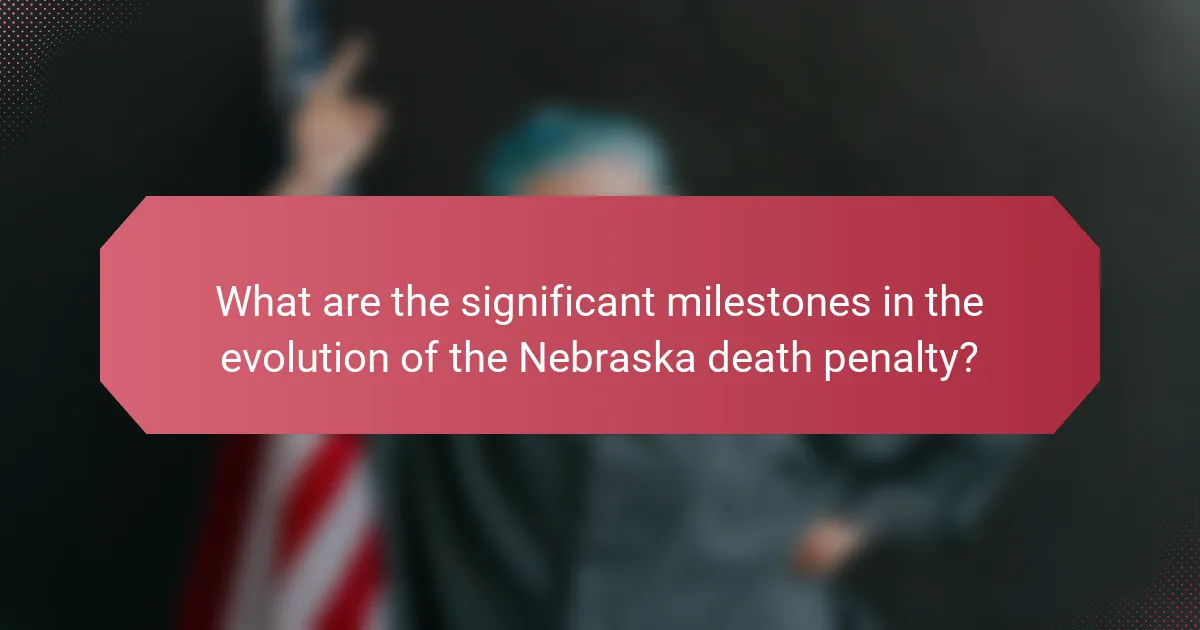
What are the significant milestones in the evolution of the Nebraska death penalty?
The significant milestones in the evolution of the Nebraska death penalty include its initial adoption in 1873. This marked the beginning of capital punishment in the state. In 1913, Nebraska replaced hanging with the electric chair as the method of execution. The state then introduced lethal injection in 2009 as the primary execution method. In 2015, the Nebraska Legislature voted to abolish the death penalty, but the governor vetoed the bill. A successful petition led to a 2016 referendum where voters reinstated the death penalty. In 2019, the state executed its first inmate in over two decades. These milestones illustrate the fluctuating status of the death penalty in Nebraska over the years.
What changes have occurred in execution methods in Nebraska?
Nebraska has shifted its execution methods from the electric chair to lethal injection. In 2009, the state enacted lethal injection as the primary method of execution. This change was part of a broader reform of the death penalty system. The electric chair was last used in 1997. Legal challenges and concerns over the drugs used for lethal injection have influenced execution practices. In 2015, Nebraska passed a law to allow the use of a single drug for lethal injection, simplifying the process. The state has faced difficulties in obtaining execution drugs, leading to delays. These changes reflect ongoing debates regarding the death penalty’s ethical implications and practical execution methods.
How have changes in execution methods reflected societal views?
Changes in execution methods have reflected shifting societal views on morality and justice. For instance, the transition from hanging to lethal injection indicates a move towards more humane practices. This shift aligns with increasing public concern for human rights and dignity. Historical context shows that as society’s values evolved, so did the methods of capital punishment. In Nebraska, the use of electrocution was once seen as progressive. However, growing opposition to its brutality led to its decline. The introduction of lethal injection in the 1970s represented a compromise between the need for punishment and the desire for humane treatment. Public opinion polls have shown fluctuating support for the death penalty, influencing legislative changes in execution methods. Thus, execution methods serve as a barometer for societal attitudes towards justice and humanity.
What controversies have arisen from execution methods in Nebraska?
Controversies surrounding execution methods in Nebraska include debates over lethal injection protocols. Critics argue that the drugs used can cause unnecessary suffering. In 2015, Nebraska switched to a new combination of drugs, raising ethical concerns. The state faced legal challenges regarding the secrecy of drug sources. Additionally, there have been discussions about the competency of execution personnel. Reports of botched executions in other states have heightened scrutiny. Public opinion on the death penalty in Nebraska has also shifted, influencing legislative actions. These factors contribute to ongoing controversies regarding execution methods in the state.
What legislative changes have occurred regarding the Nebraska death penalty?
In 2015, the Nebraska Legislature passed a bill to abolish the death penalty. This marked a significant legislative change, as it ended the state’s capital punishment system. The bill was signed into law by Governor Pete Ricketts but faced a subsequent voter referendum. In 2016, Nebraska voters chose to reinstate the death penalty. This reinstatement reflected the public’s support for capital punishment despite the previous legislative change. The back-and-forth nature of these decisions highlights the contentious debate surrounding the death penalty in Nebraska.
What recent laws have been enacted or repealed concerning capital punishment?
Several recent laws have been enacted or repealed concerning capital punishment in various states. For instance, in 2021, Virginia abolished the death penalty, becoming the 23rd state to do so. This law was enacted by the Virginia General Assembly and signed by Governor Ralph Northam. Additionally, in 2022, Maryland’s Governor reinstated the death penalty for certain crimes, reversing a previous ban. These legislative changes reflect ongoing debates and shifts in public opinion regarding capital punishment across the United States.
How have public initiatives influenced legislative changes?
Public initiatives have significantly influenced legislative changes by mobilizing public opinion and driving policy reform. In Nebraska, for instance, grassroots campaigns have led to the repeal of the death penalty. A notable example is the 2015 initiative that aimed to overturn the legislative repeal of the death penalty from the previous year. This initiative gathered enough signatures to place the issue on the ballot. Ultimately, it demonstrated how organized public efforts can directly impact legislative decisions. The successful campaign reflected a shift in public sentiment regarding capital punishment. This shift was evidenced by polling data showing increased support for repeal among Nebraska voters. Thus, public initiatives serve as a powerful mechanism for influencing legislative outcomes in matters such as the death penalty.
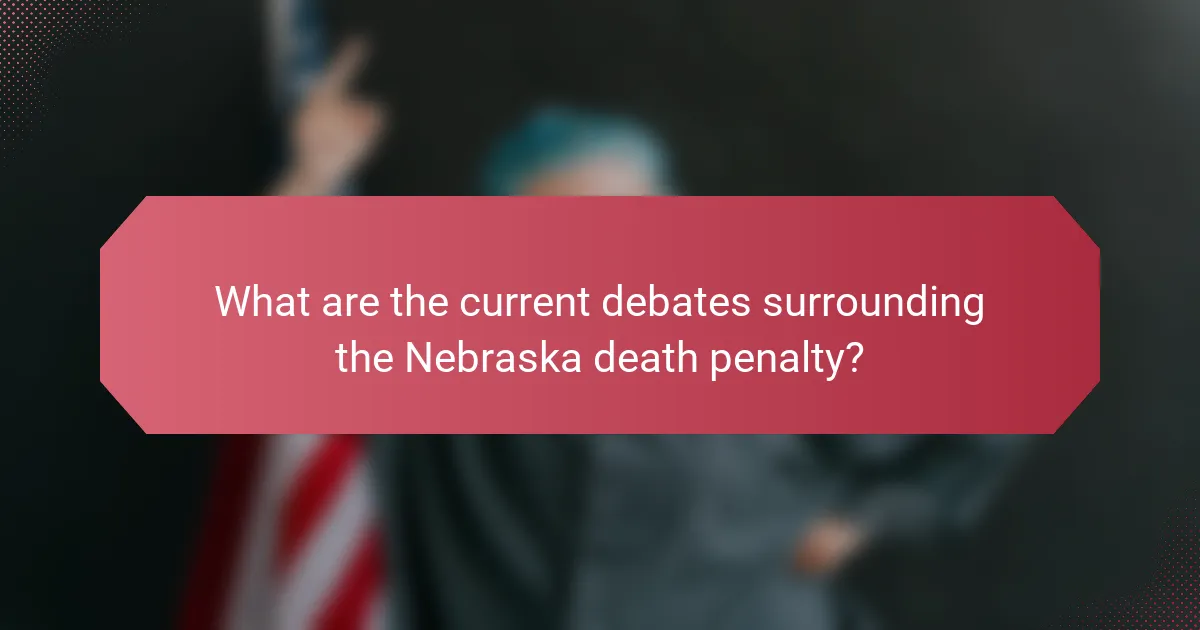
What are the current debates surrounding the Nebraska death penalty?
Current debates surrounding the Nebraska death penalty focus on its morality, effectiveness, and implementation. Critics argue that the death penalty is inhumane and prone to errors. Supporters claim it serves as a deterrent to serious crimes. There are also discussions about the costs associated with capital trials versus life imprisonment. Additionally, the availability of lethal injection drugs has raised concerns about execution methods. Recent legislative efforts have aimed to abolish the death penalty, reflecting changing public opinion. In 2015, Nebraska lawmakers voted to repeal the death penalty, but this was later overturned by a voter referendum. These ongoing debates highlight the complexities and evolving perspectives on capital punishment in Nebraska.
What arguments exist for and against the death penalty in Nebraska?
Arguments for the death penalty in Nebraska include deterrence of crime and retribution for victims’ families. Proponents argue that the death penalty serves as a deterrent to potential criminals. They believe that the fear of execution may prevent heinous crimes. Additionally, supporters claim it provides justice and closure for victims’ families. They feel that capital punishment is a necessary response to the most severe offenses.
Arguments against the death penalty in Nebraska focus on the risk of wrongful convictions and moral concerns. Opponents highlight that wrongful convictions can lead to innocent people being executed. Studies indicate that a significant percentage of death row inmates are later exonerated. Moral arguments center on the belief that taking a life is inherently wrong, regardless of the circumstances. Critics also point out the high costs associated with death penalty cases compared to life imprisonment.
How do proponents justify the continuation of the death penalty?
Proponents justify the continuation of the death penalty by arguing it serves as a deterrent to crime. They believe that the fear of execution prevents individuals from committing serious offenses. Studies often cited include research indicating a correlation between the death penalty and reduced murder rates. Additionally, supporters claim it provides justice for victims and their families. They argue that the severity of the punishment reflects the gravity of heinous crimes. Proponents also emphasize the death penalty as a means of ensuring public safety. They contend that it permanently removes dangerous criminals from society. Furthermore, they assert that the legal system includes safeguards to prevent wrongful executions. This includes appeals and reviews that aim to uphold justice.
What are the main arguments from opponents of the death penalty?
Opponents of the death penalty argue primarily that it is inhumane and leads to wrongful executions. They assert that the risk of executing an innocent person is significant. Studies indicate that wrongful convictions occur in approximately 4% of death penalty cases. Additionally, opponents highlight that the death penalty does not deter crime effectively. Research has shown that states without the death penalty often have lower murder rates. Furthermore, they argue that the application of the death penalty is biased, disproportionately affecting marginalized communities. This systemic inequality raises ethical concerns about fairness in the justice system. Lastly, opponents contend that life imprisonment without parole is a more humane and effective alternative.
What implications do current debates have for the future of the Nebraska death penalty?
Current debates surrounding the Nebraska death penalty suggest potential changes in its future. Activists advocate for abolition due to ethical concerns and wrongful convictions. Legislative discussions indicate a possible shift towards reform or repeal. Public opinion polls show increasing support for alternatives to capital punishment. Recent court rulings may impact the legality and application of the death penalty. These factors collectively indicate a trend towards reevaluation of Nebraska’s capital punishment system. Historical context reveals a fluctuating stance on the death penalty, influenced by societal values and legal precedents.
How might public opinion shape future legislation?
Public opinion can significantly influence future legislation by swaying lawmakers’ decisions. When a majority of citizens express strong views on an issue, legislators often feel compelled to respond. This phenomenon is evident in the evolution of the death penalty in Nebraska. For example, public sentiment against capital punishment has led to legislative efforts to abolish it. In 2015, the Nebraska legislature voted to repeal the death penalty, reflecting a shift in public opinion. Polls indicated that a growing number of Nebraskans opposed capital punishment. As public attitudes evolve, legislators may introduce new laws or amend existing ones to align with constituents’ views. This dynamic illustrates the power of public opinion in shaping legislative outcomes.
What trends are emerging in the national conversation about the death penalty?
Emerging trends in the national conversation about the death penalty include a growing opposition to its use. Many states are reconsidering their death penalty policies. Public opinion is shifting towards alternatives, such as life imprisonment without parole. Additionally, there is increased scrutiny over wrongful convictions and racial disparities in sentencing. Recent studies indicate that states with active death penalty laws are seeing a decline in executions. Advocacy groups are raising awareness about the moral implications of capital punishment. Furthermore, legislative efforts to abolish the death penalty are gaining traction in several states. These trends reflect a broader movement towards criminal justice reform.
What resources are available for understanding the Nebraska death penalty?
Resources available for understanding the Nebraska death penalty include state government websites, legal databases, and academic publications. The Nebraska Department of Correctional Services provides official information on policies and procedures related to the death penalty. The Nebraska Legislative Research Office offers legislative history and analysis of death penalty laws. Legal databases like Westlaw and LexisNexis contain case law and legal commentary specific to Nebraska. Academic publications from universities, such as the University of Nebraska, provide research and analysis on the historical context and evolution of the death penalty in Nebraska. Additionally, non-profit organizations like the Nebraska ACLU publish reports and position papers on the death penalty’s impact and ethical considerations. These resources collectively offer a comprehensive overview of the topic.
The primary entity of this article is the Nebraska death penalty, which has a complex historical context and has evolved significantly since its inception in 1873. The article outlines key milestones, including changes in execution methods from hanging to electrocution and finally to lethal injection, along with legislative actions that have alternated between abolition and reinstatement. It also discusses the influence of societal attitudes, legal frameworks, and significant court rulings on the death penalty’s status in Nebraska. Additionally, the article highlights ongoing debates regarding its morality, effectiveness, and the implications of public opinion on future legislation.
